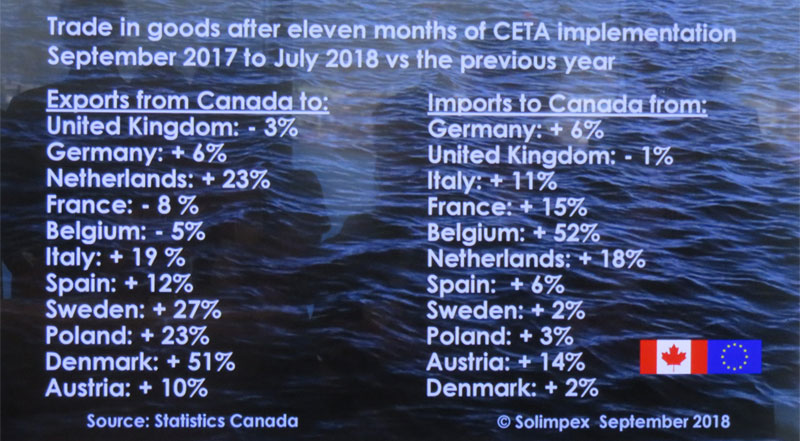Has CETA Benefited Canadian Business One Year Later?
Left to Right: BC Minister of Jobs, Trade and Technology Bruce Ralston with president Celso Boscariol and executive director Alex Martyniak both of the EU Chamber of Commerce in Canada West. (Nikao Media)
Free trade is a hot economic and political topic these days. While NAFTA is still in legal limbo, CETA is showing signs of progress.
Negotiations are still underway with the contentious North American Free Trade Agreement (NAFTA) that has put the Canada in a bind. Across the Atlantic, Canada’s trade with the EU is moving along.
Last September, the Canada – European Union (EU) Comprehensive Economic and Trade Agreement (CETA) was provisionally implemented. The accord removes virtually all tariffs on goods flowing between Canada and the EU.
Why CETA benefits Canadian Businesses
The EU represents the world’s second largest economy by gross domestic product (GDP). In 2017, total EU GDP amounted to $23.1 trillion. The EU is Canada’s second largest trading partner.
“Even with Brexit looming and United Kingdom’s impending departure from the EU, the EU will still remain larger than the US economy and provide us with a very lucrative market,” said Celso Boscariol, president of the EU Chamber of Commerce in Canada West, at the first anniversary celebration of CETA in Vancouver yesterday.
“CETA will facilitate access for Canadian businesses to a prosperous EU market with more than 400 million inhabitants. Adding the UK, that would be over 500 million people. This will offer Canadian businesses significant opportunities to diversify their sales and services without dependency on the US market.”
Boscariol added that CETA creates a lot of opportunities, particularly for small to medium size business. Both EU and Canada are 90 percent powered by small and medium-sized enterprises. He highlighted five key points that will benefit Canadian businesses and professionals.
- Removal of tariffs on exported and imported goods
- Access to government procurement contracts
- Labour mobility
- Harmonization for the accreditation of foreign credentials
- Harmonization of regulatory standards
Related: Lyon: Heart of the European Silk Industry >
Opportunities for British Columbia
Canada is the first country that the EU has ever established such an ambitious accord. Canadian companies will have a head-start to develop businesses with the Europeans before other countries.
Speaking at the celebration, BC Minister of Jobs, Trade and Technology Bruce Ralston said that with the pending NAFTA deal and the Comprehensive and Progressive Agreement for Trans-Pacific Partnership (CPTPP), British Columbians would have even greater work and business opportunities that will last for a few generations.
CETA Setbacks
In her recent interview with the Canadian Press, European trade commissioner Cecilia Malmstrom cited a lack of awareness in Canada and a wave of anti-globalization nationalism overseas may be contributing to Canada’s slow start to seizing CETA opportunities.
According to the Pew Research Center survey, few people globally see the EU as the world’s leading economic power. The EU is not perceived as a powerful economy as the U.S. and China.
Canada has met the legal requirements for CETA to come into full force, but not the EU. Under EU law, all 28 EU member states must receive approval from their respective parliaments at the national and sometimes, regional level.

The figures show an increase of Canadian exports to the EU since CETA’s provisionally came into effect. (Nikao Media)
Progress One Year Later
CETA showed early signs of success, despite setbacks that may hold Canadian companies from moving swiftly to capitalize on the great opportunities. Exports from Canada to Denmark are up 51 per cent, followed by Sweden 27 per cent, Poland and Netherlands, 23 per cent.
Port of Montreal, the country’s second largest port reaped CETA benefits as container traffic jumps almost 20 per cent in July compared with the same month last year, cited The Globe and Mail.

 ©Nikao Media
©Nikao Media
 © Rep. of Turkey Ministry of Culture and Tourism
© Rep. of Turkey Ministry of Culture and Tourism ©Johan Berge/Visitnorway.com/Museum of Cultural History, University of Oslo
©Johan Berge/Visitnorway.com/Museum of Cultural History, University of Oslo © Nikao Media
© Nikao Media
 ©Nikao Media
©Nikao Media